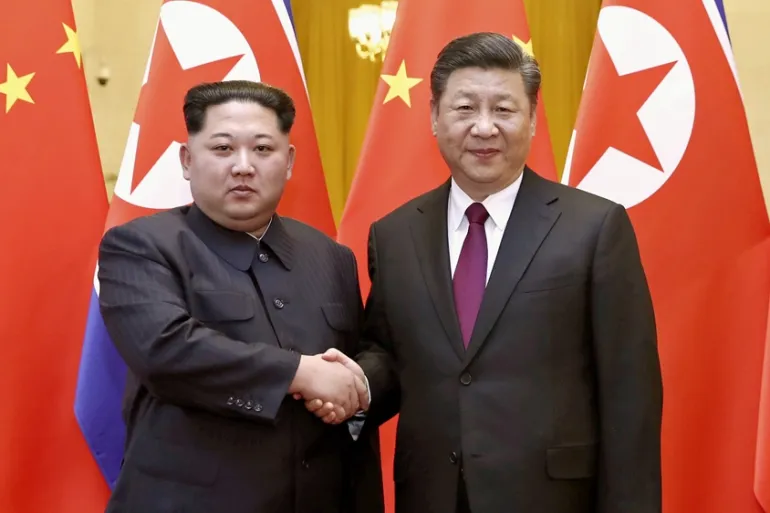Table of Contents
Introduction
The pursuit of nuclear capabilities by China and North Korea poses a significant challenge to global efforts aimed at nuclear non-proliferation. Nuclear development plans are a defining characteristic of both China and North Korea. China carried out its first nuclear development plans in October 1964, while North Korea carried out its first nuclear tests in October 2006. Since conducting their initial nuclear tests, the two nations have progressively expanded their nuclear development plans. Despite their 1994 and 1996 admission to the CTBT, China and North Korea have persisted in their nuclear proliferation endeavours.
The Pentagon’s most recent report states that China presently has 500 nuclear warheads. According to a report published by the Stockholm International Peace Research Institute (SIPRI), North Korea currently possesses 30 nuclear warheads.
Nuclear Development Activities by China
China can soon test nuclear weapons due to a weakened CTBT regime. To extract plutonium from the spent fuel from its nuclear power plants, China has been constructing facilities for the reprocessing of nuclear fuel.
China has undertaken substantial efforts to upgrade its nuclear infrastructure, including the development of fuel reprocessing facilities and the deployment of multiple independently targetable re-entry vehicles (MIRVs). While officially committed to the CTBT, China’s actions, such as construction activities at nuclear test sites, indicate a disregard for its obligations under the treaty. The rapid modernization of China’s nuclear arsenal suggests a potential breach of the CTBT’s objectives, with projections indicating a significant increase in its warhead stockpile by 2035.
China continues to only comply on paper with the CTBT regime. China has been involved in activities that are incompatible with the “zero yield” standards, according to the report titled “Adherence to and Compliance with Arms Control, Non-proliferation, and Disarmament Agreements and Commitments.”
China will be able to augment its current stockpile by means of its ongoing endeavours to enlarge its nuclear arsenals. By 2035, China’s current rate of modernization and development will enable the country to deploy about 1,500 warheads. According to Pentagon estimates, Beijing plans to accumulate 700 warheads by 2027 in order to meet its 2030 target of 1,000 warheads.
Nuclear Development Activities by North Korea
Nuclear tests by belligerent states like North Korea will be encouraged by a weakened CTBT and a dearth of international support.
North Korea’s persistent pursuit of nuclear capabilities has been characterized by repeated underground tests since 2006, despite condemnation from the international community. Consequently, it disproves the CTBT’s claim that the current regime is responsible for North Korea’s denuclearization. As the CTBT gradually deteriorates, North Korea will be able to test nuclear weapons to destabilise the world and gain leverage over the US. Estimates suggest that Pyongyang has made progress in developing small-scale nuclear weapons.
In 2022, North Korea conducted over 70 ballistic missile tests. The lack of international support and a weakened CTBT regime have emboldened North Korea to continue its provocative actions, including ballistic missile tests and the development of tactical nuclear weapons. The escalating tensions in the region underscore the urgent need for diplomatic efforts to mitigate the threat posed by North Korea’s nuclear ambitions
Implications of Nuclear Development Programs
The growing nuclear capabilities of China and North Korea have profound implications for regional security and stability. Neighbouring countries, including South Korea and Japan, are increasingly concerned about the escalating arms race and the potential for instability in the region.
According to a recent Pew Research Centre survey from 2022, a sizable portion of the populations in South Korea and Japan harboured anti-Chinese feelings.
South Korea had the highest percentage of respondents (81%), followed by Japan (69%), which also had a negative attitude towards China. Approximately 39% of South Koreans and 56% of Japanese respondents to a Chicago Council survey said they supported their countries’ nuclear armament programmes.
Rising anti-China sentiments and calls for nuclear armament in South Korea and Japan highlight the urgent need for diplomatic dialogue to address the underlying tensions and prevent further proliferation.
Challenges to International Non-Proliferation Efforts
The unchecked pursuit of nuclear capabilities by China and North Korea presents a significant challenge to global non-proliferation efforts. The CTBT, intended to serve as a cornerstone of international efforts to curb nuclear proliferation, is increasingly undermined by the actions of signatory states. The failure of the international community to effectively address the root causes of nuclear proliferation risks exacerbating tensions and undermining decades of progress in nuclear disarmament and arms control efforts.
The Role of Diplomacy and Dialogue
Addressing the escalating nuclear capabilities of China and North Korea requires a coordinated and multilateral approach grounded in diplomacy and dialogue. Efforts to engage both nations in constructive dialogue aimed at addressing security concerns and promoting transparency are essential to de-escalating tensions and preventing further proliferation. Additionally, international institutions and mechanisms, such as the United Nations Security Council, must play a proactive role in holding states accountable for their obligations under existing non-proliferation treaties and agreements.
Conclusion
In conclusion, the escalating nuclear capabilities of China and North Korea pose a formidable challenge to global efforts aimed at nuclear non-proliferation. The unchecked pursuit of nuclear weapons by both nations threatens regional security and stability, underscoring the urgent need for diplomatic engagement and multilateral cooperation. The international community must remain vigilant in addressing the root causes of nuclear proliferation and work towards a comprehensive and sustainable solution that promotes peace and security for all nations. Failure to do so risks undermining the very foundations of global security and stability.
